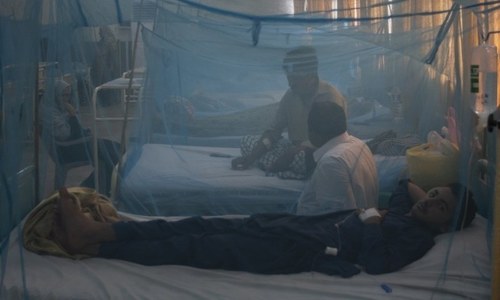KARACHI: As the Sindh health department said that a total of 90,696 cases of four vector-borne diseases were reported in the province in the first nine months, experts cast doubt over the official data, arguing that many cases go unreported due to flaws in the reporting system.
Sources said the provincial burden of the vector-borne diseases — malaria, dengue, Congo fever and leishmaniasis (a parasitic disease) —that exists in government record is alarmingly high, raising concern over the actual number of affected patients.
These diseases, the experts said, can easily be prevented, helping the government save funds being spent on disease treatment, by giving due attention to hygiene and sanitation and educating the public on disease prevention.
According to the sources, the current budgetary allocation for two major endemic vector-borne diseases is approximately Rs384 million — Rs50m for dengue and Rs334m for malaria. A large chunk of this amount goes into employees’ salaries.
There was no specific budgetary allocation for Congo fever and leishmaniasis, the other two vector-borne diseases, and, in case of an outbreak, district health funds were utilised.
With 87,751 malaria cases, experts urge govt to focus on disease prevention
Of the 90,696 cases, malaria topped the list with 87,751 cases.
The largest number of malaria cases is reported in Thatta (20,130) followed by Umerkot (12,203), Badin (9,416), Larkana (8579), Sujawal (8113), T.M.Khan (6918), Mirpurkhas (4786), Kamber (3977), Tharparkar (2393), Jacobabad (1428), Khairpur (1333), Tando Allahyar (1199), Dadu (927), Shikarpur (863), Shaheed Benazirabad (757), Hyderabad (702), Kashmore (683), Jamshoro (635), Sanghar (329), Ghotki (374), Naushehro Feroze (349), Matiari (345) and Sukkur (300).
In Karachi, district South has the largest number of cases (420) followed by Korangi (151), Malir (124), West (115), Central (111) and East (28).
Unlike dengue, a mosquito-borne viral disease, malaria is caused by a parasite that commonly infects a certain type of mosquito which feeds on humans.
15 die of dengue this year
The province, the health department data say, has seen an increase in dengue deaths this year as the disease claimed three lives in 2020 and 15 this year so far.
A total of 3,270 cases, according to the data, have been reported from January till to date whereas 4,380 cases were reported in 2020.
This month alone, a total of 1,291 cases were reported. In Karachi, the most affected areas are district East (179 cases) and district Central (169). Three patients died of dengue in Karachi and two in Hyderabad this year.
A big question mark, however, exists over the credibility of government’s dengue data as the Indus Hospital recently reported 1,915 cases of the disease from October 1 till to date with three mortalities from dengue.
Asked about this disparity in data, Dr Ghulam Parwar, assistant director at the directorate of health services, Sindh, explained that the hospital was not sharing its data on a daily basis with the department unlike other healthcare facilities and labs in the province.
“Also, we found that several patients who tested positive for dengue at the Indus Hospital were already listed in our data. The hospital had also tested a single patient a few times but this matter will be sorted out soon,” he said, adding that currently the province was experiencing the high transmission season of dengue that started from August and ends in November.
A spokesperson of the Indus Hospital denied his statement and said not a single patient was tested twice.
960 cases of leishmaniasis
Another parasitic disease that continues to affect a significant population in Sindh is leishmaniasis. It is classified as a neglected tropical disease caused by protozoan parasites, which are transmitted by the bite of infected female phlebotomine sandflies.
According to the health department data, leishmaniasis cases have been greater this year than the previous two years; 724 cases in 2018, 513 in 2019 and 960 in 2021.
District Jacobabad reported the largest number of cases (439) followed by district South (199), Shikarpur (91), Sukkur (58), Sukkur (58), Larkana (43), Kashmore (37), Dado (36), Jamshoro (22), Kamber (20) and Hyderabad (15).
Six Congo fever cases
So far, this year six cases of Congo fever have been reported in the province. Two patients died.
“Health experts would agree that this data doesn’t reflect the true picture and that the actual number of vector-borne diseases in the province would be greater in numbers,” said Dr Sajjad Siddiqui, a senior public health expert associated with United Nations Population Fund’s project to end fistula.
He added that these diseases mainly affected tropical countries including India, Bangladesh and some African countries.
He emphasised that the government must take steps for their prevention to reduce illness.
“Dengue and malaria can easily be prevented by giving due attention to sanitation conditions and creating public awareness. Also, it is important to know that the WHO has approved a malaria vaccine, which is being considered a major breakthrough in public health,” he said.
Right now, he pointed out, the vaccine was being used in African countries with a high burden of malaria patients and deaths from the disease. “It’s the only vaccine with four shots and soon will be available in other tropical countries. The disease can be deadly if a certain type of malaria is not promptly treated.”
Published in Dawn, October 28th, 2021














































